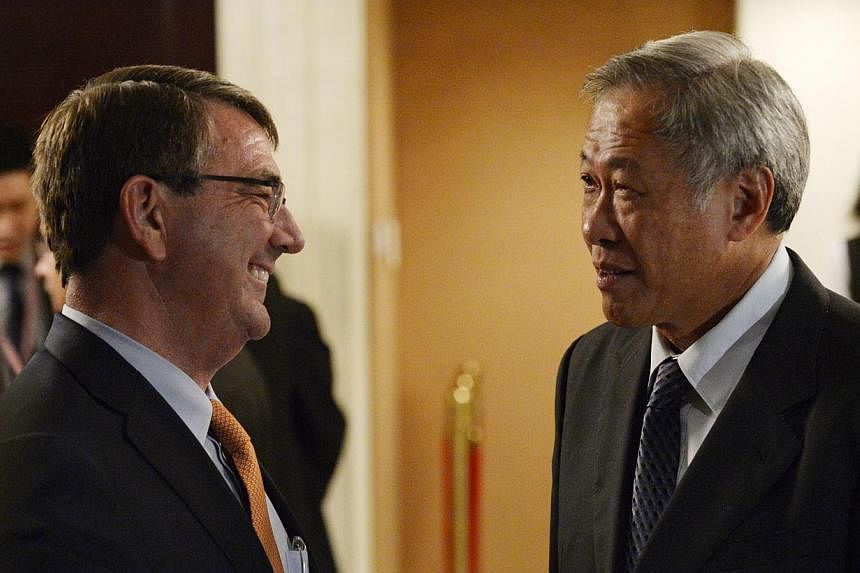
SINGAPORE - The United States, Japan and Australia called on China and others to clarify their claims in the South China Sea and halt all land reclamation, hours after the US asserted its dominance in Asia with stepped-up strategic ties with major countries in the region and pledging more than half a billion dollars to help build up their maritime capabilities.
"China has reclaimed 2,000 acres, more than all other claimants combined," US Defence Secretary Ashton Carter said yesterday at the annual Shangri-La Dialogue organised by the International Institute for Strategic Studies (IISS). "And China did so only in 18 months. It is unclear how much farther China will go."
While he called for the peaceful settlement of rival territorial claims in the South China Sea, Dr Carter also pledged that America would maintain a substantial presence in the region and "will fly, sail, and operate wherever international law allows".
China and Taiwan, along with four Asean nations - Vietnam, Malaysia, the Philippines and Brunei - have competing claims over parts of the South China Sea.
The US and its allies will not be deterred from exercising their rights, he said, adding that "turning an underwater rock into an airfield simply does not afford the rights of sovereignty or permit restrictions on international air or maritime transit".
China reacted promptly at the end of Dr Carter's speech, with Senior Colonel Zhao Xiaozhuo from China's Academy of Military Science saying Beijing's actions are "legitimate, reasonable and justified".
Observers said the exchange was far less confrontational than had been widely expected.
Reaffirming America's strategic rebalance to Asia, Dr Carter said it is aimed at helping the region to "have the security and opportunity to rise and prosper". The US, he said, would be available to provide security in the Asia-Pacific for decades to come.
It will deepen longstanding alliances, diversify its force posture and invest in new military capabilities and war platforms.
One key measure is a US$425 million (S$572 million) plan to help South-east Asian countries strengthen their maritime capabilities through military exercises and equipment purchases.
This week, Dr Carter will also ink deals with Vietnam and India to deepen military cooperation. This comes at a time when Washington is already doing more with other regional partners to build a security framework that must "reward cooperation, not coercion", he said.
Dr Carter, who was speaking as Pentagon chief at the Shangri-La Dialogue for the first time yesterday, portrayed a picture of enduring US military dominance and said it is adding technologies to its arsenal like new unmanned systems in the air and sea, a long-range bomber, electromagnetic railgun and lasers.
Some of the best and the latest equipment, like the navy's P-8 Poseidon aircraft and Virginia Class submarines, will also be brought to the Asia-Pacific.
Later in the day, Dr Carter sat down with his counterparts from Japan and Australia on the sidelines of the summit for trilateral defence ministers' talks.
A joint statement after the meeting said they expressed strong opposition to the use of coercion or force to alter the status quo in the East China Sea and South China Sea unilaterally.
"They urged all South China Sea claimants to exercise self-restraint, halt reclamation activities, take steps to ease tensions and refrain from provocative actions that could escalate tensions," the statement said.
"They called on governments to clarify and pursue territorial claims and accompanying maritime rights in accordance with international law."
Weighing in on the hot-button issue, Chinese defence officials say that freedom of navigation in the South China Sea "has never been affected".
Rear-Admiral Guan Youfei, director of the Chinese defence ministry's Foreign Affairs Office, told reporters on the sidelines of the meeting: "On the other hand, freedom of navigation should be about benefiting economic development, not about allowing a country to deploy its military vessels everywhere."
The three-day gathering of 26 defence chiefs and some 300 top military brass ends today.


